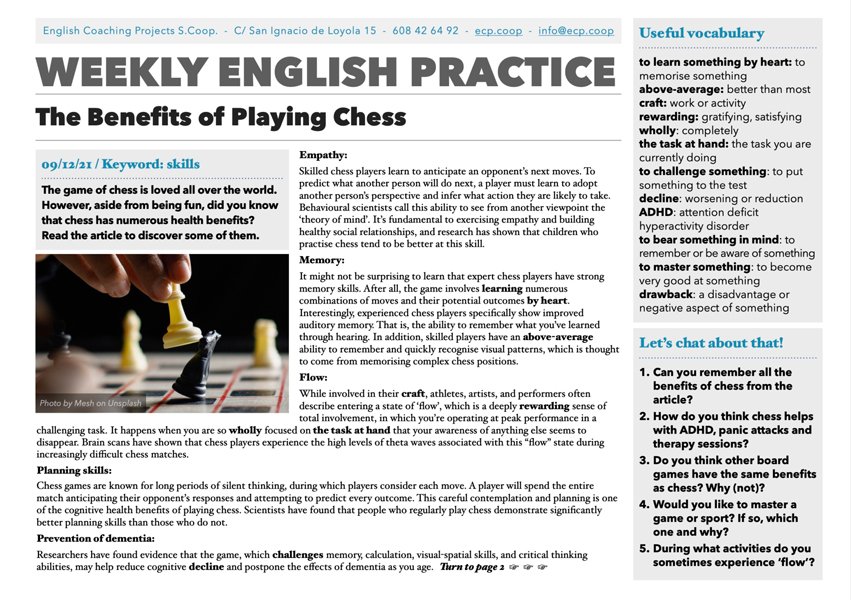The Benefits of Playing Chess
09/12/21 / Keyword: skills
The game of chess is loved all over the world. However, aside from being fun, did you know that chess has numerous health benefits? Read the article to discover some of them.
Click HERE to download the Weekly English Practice as a PDF.
Useful vocabulary
to learn something by heart: to memorise something
above-average: better than most
craft: work or activity
rewarding: gratifying, satisfying
wholly: completely
the task at hand: the task you are currently doing
to challenge something: to put something to the test
decline: worsening or reduction
ADHD: attention deficit hyperactivity disorder
to bear something in mind: to remember or be aware of something
to master something: to become very good at something
drawback: a disadvantage or negative aspect of something
Listen to the audio and read the text (refresh the page if it’s not visible).
The game of chess is loved all over the world. However, aside from being fun, did you know that chess has numerous health benefits? Read the article to discover some of them.
Empathy:
Skilled chess players learn to anticipate an opponent’s next moves. To predict what another person will do next, a player must learn to adopt another person’s perspective and infer what action they are likely to take. Behavioural scientists call this ability to see from another viewpoint the ‘theory of mind’. It’s fundamental to exercising empathy and building healthy social relationships, and research has shown that children who practise chess tend to be better at this skill.
Memory:
It might not be surprising to learn that expert chess players have strong memory skills. After all, the game involves learning numerous combinations of moves and their potential outcomes by heart. Interestingly, experienced chess players specifically show improved auditory memory. That is, the ability to remember what you’ve learned through hearing. In addition, skilled players have an above-average ability to remember and quickly recognise visual patterns, which is thought to come from memorising complex chess positions.
Flow:
While involved in their craft, athletes, artists, and performers often describe entering a state of ‘flow’, which is a deeply rewarding sense of total involvement, in which you’re operating at peak performance in a challenging task. It happens when you are so wholly focused on the task at hand that your awareness of anything else seems to disappear. Brain scans have shown that chess players experience the high levels of theta waves associated with this “flow” state during increasingly difficult chess matches.
Planning skills:
Chess games are known for long periods of silent thinking, during which players consider each move. A player will spend the entire match anticipating their opponent’s responses and attempting to predict every outcome. This careful contemplation and planning is one of the cognitive health benefits of playing chess. Scientists have found that people who regularly play chess demonstrate significantly better planning skills than those who do not.
Prevention of dementia:
Researchers have found evidence that the game, which challenges memory, calculation, visual-spatial skills, and critical thinking abilities, may help reduce cognitive decline and postpone the effects of dementia as you age.
Chess can also help with the symptoms or severity of several other health conditions, including ADHD and panic attacks. Playing this challenging game is even said to improve the effectiveness of psychotherapy. It’s also known to enhance the development of problem-solving skills as well as relationship-building skills in children.
If you’re considering chess as a hobby, you should bear in mind that it can be time-consuming and sometimes stressful, especially if you plan to master the game or compete in tournaments, but you’ll have to decide whether these drawbacks outweigh the potential cognitive health benefits. It’s your move.
Adapted from www.healthline.com by ECP coach Alison Keable
Let’s chat about chess skills!
- Can you remember all the benefits of chess from the article?
- How do you think chess helps with ADHD, panic attacks and therapy sessions?
- Do you think other board games have the same benefits as chess? Why (not)?
- Would you like to master a game or sport? If so, which one and why?
- During what activities do you sometimes experience ‘flow’?

